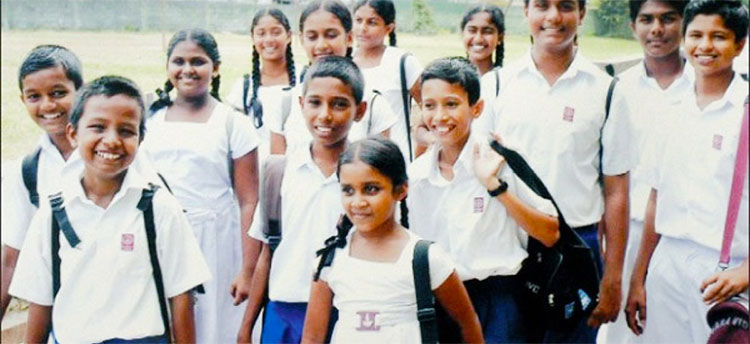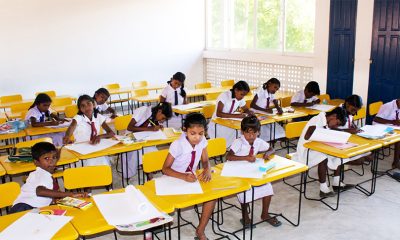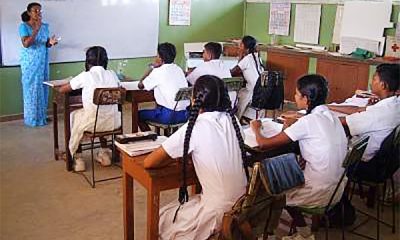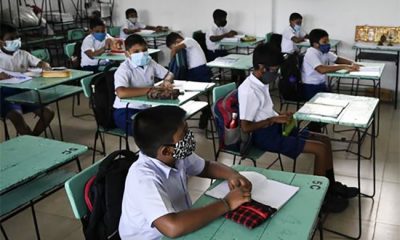Features
Education: Personal goals attuned to social progress

by Susantha Hewa
Education, for an overwhelming majority of students and their parents, is the one and only way for gainful employment, financial success, upward mobility and social recognition. Yet, it is just where education is made to function in its most utilitarian gear, grooming the individual for a livelihood. Education is also a handy tool for the fashioning of a cultured person who can contribute towards both individual and social wellbeing. However, in an exam-oriented, competitive system, which is primarily designed to provide workers to run the economy, the above broader function of education naturally gets underrated and overlooked. This has produced two factions debating about the primary function of education: whether it should prepare individuals for jobs or guide them to be refined citizens, who can contribute towards social progress.
It’s no good eternally arguing whether education is for jobs or, alternatively, for making students to be good, intelligent citizens as well as furthering overall social progress. We often seem to think that these targets are mutually exclusive, which may not be the case.
Those who favour job-oriented education seem to consider ‘inculcating values’ as too naïve and wishy-washy. Conversely, those who overemphasize education’s role of value-inculcation seem to dismiss job-oriented education as starkly materialistic. Both parties seem to look at these two broad aims of education with some bias. However, the fact is, those seemingly opposite aims need not be contradictory. Education can be made to meet both these ends: employability and the inculcation of values for individual fulfilment and social cohesion. There is nothing to prevent proficient employees being broad-minded citizens and vice versa. What we need is the political will and the pooling of expertise of all interested parties including educationists, economists, psychologists, administrators, academics and professionals of arts and sciences to achieve both personal and collective goals.
In fact, education plays a crucial role in promoting self-fulfillment as well as social advancement. All beings are naturally self-centered and continuously look for opportunities for self-gain. Hence, it’s not strange that today, for each person, education appears to be one of the safest means of achieving their personal goals – wealth, comfort and social recognition. There is nothing reprehensible at all in it. After all, as a means of achieving those desirable things in life, education is more society-friendly than most other options available, specially, for those who don’t rely much on education: deceit, profiteering, theft, money laundering, sale of liquor and dangerous drugs and, last but not least, dabbling in politics. So how can we condemn those who pursue education for moving from “rags to riches”?
One may say that education should not be seen as a magic formula for prosperity and that learning is too sacred a pursuit to be regarded as a key to material success, power and social status. However, such a view often fails to recognize that education, in its different forms, serves as the best bet for securing a decent livelihood for many people in a civilised world and also, that it has taken the place of the brute force characteristic of primitive life which happened to be a relentless struggle for survival. As such, if one condemns education being used as a way to personal success, one may do it at one’s own peril, for the alternative paths available may turn out to be starkly antisocial.
In fact, our aversion towards higher education being used as a way of producing “employable graduates” seems to come from our disapproval of it being used to sustain a profit-oriented economy which divides education as ‘useful’ and ‘useless’ according to how it serves to maximise profit of a handful of elites while leaving an overwhelming majority in dire poverty. Further, we forget that ‘employability’ assumes that derogatory sense only in a context where the economy absorbs graduates to maximise profits of a few.
There would be nothing sinful about being groomed to be employable, if we happened to be living in a world where economic growth were an indicator of individual happiness and social wellbeing. George Monbiot, the author of “Out of the wreckage; a new politics for an age of crisis” captures the sense of cynicism of the average citizen living in a consumerist society, when he says, “Defined by the market, defined as a market, human society should be run in every respect as if it were a business, its social relations reimagined as commercial transactions; people redesignated as human capital”. The idea of ‘employable graduate’ should not be thrown out with the noxious bathwater of extreme competition and individualism.
The low estimation of humanities and social sciences in higher education is not an indication of their so-called irrelevance. The discriminatory attitude cannot be easily got rid of since it is the corporate interests that decide their ‘value’ in a competitive society. It is due to this that the disgruntled voices about arts stream subjects being neglected continue to fall on deaf ears. It would be an uphill task to raise them to the level of the subjects favoured by the business world. So far as the economic growth of a country remains to be just impressive statistics on paper without them reflecting the physical and mental wellbeing of the common people, the humanities and social sciences are going to look lacklustre in the eyes of those who call the shots.
Questioning, researching, analyzing and critical thinking that are often marketed to assert the importance of the so-called ‘soft subjects’, as against hard sciences, are not likely to cut much ice with those who want education to simply spawn workers, including professionals, to keep the economy going and huge profits flowing into their hands. In such a setting that workers, both skilled and unskilled, are not paid for their questioning or critical thinking skills cannot make headlines.
Among the whole gamut of worrisome issues in education are: resource-depleted rural schools, heavy workload for both students and teachers, obsolete teaching methods, long school hours, dependency on tuition industry, lack of opportunities for students for recreation, disproportionate homework, tedium, teachers burdened with redundant paperwork, obsession with continuous testing and crippling exams, insufficient scope for creative work, aesthetics, sports, soft skills, segregation of schools on ‘ethnicity’ and lack of timely upgrading of content and teaching methods., etc. All these problems cannot be separated from economy and politics. It would be a hard job for those who are sincerely concerned about using education’s many capacities for promoting good and eliminating vice, because education cannot be prevented from being putty in the hands of those with personal and political agendas.
Obviously, those who are ensconced in power and affluence cannot be expected to suffer education serving in any way to undermine their positions. Prof. Alvin Toffler in his book “The Third Wave” (sequel to his book “The Future Shock”) writes, “schools produced, just as factories do, employees who could fit into the slots of the hierarchical structure of industrial societies by programming them through a ‘covert curriculum’ to be compliant, dutiful and diligent”. This may not be far from the truth, because greedy politicians and business magnates who control the economy will always want the prevailing system to go on with the least resistance. They wouldn’t want to tap the full potential of education to prompt students to question and challenge anything established including the present economic order favouring the elites.
The fact is, our education system primarily appeals to the individual’s sense of self-aggrandisement in a society, in which being educated is to become humiliated if what you have studied has no market value. Unlike the students of science, IT and commerce streams, the graduates of history, sociology, literature, etc. cannot help business magnates to fatten on their profits. Therefore, education in humanities and social sciences, which doesn’t equip students to find their convenient niches in a profit-oriented economy, wouldn’t be favourably viewed at all by the major players.
Therefore, it would be futile to think that enhancing the quality of education will bring about a just society unless the natural desires of the student are aligned with education’s capacity for uncovering the essential link between individual happiness and social progress. In other words, the more ambitious the student is to realize his dreams, the more momentum it should give for social advancement.
The present situation of arts stream subjects inexorably receiving stepmotherly treatment cannot be changed until there remains a strict division between arts and science subjects. And, it is only when the so-called economic growth is made to serve all the people and not a lucky few that the society will be able to create meaningful space for humanities and social sciences to play a role in society as important as the hard sciences. It goes without saying that the economy should be made people-friendly instead of remaining self-serving and profit-friendly. In his book “Ruptures in Sri Lanka’s Education: Genesis, present status and reflections”, Prof. Panduka Karunanayake correctly points out that “when local industries pick up and overseas ones open up to our workers, qualification inflation will ease – educationists can then fruitfully focus on the broader issues in education, including the inculcation of civic values, etc.” Although he is optimistic that the growth of economy, in its present form itself, will pave the way for educationists to step in to play a broader and more important role in education, the point he emphasizes here, among other things, is the importance of harnessing education to realise full human potential instead of it being woefully underutilised to providing livelihoods. However, what is undeniable is that what role we get our economy to play – whether we leave it in the hands of those VIPs for money making or use its massive potential to primarily serve society – will have a lasting impact on the whole education system.
It is only within a humane model of governance, which makes economic interests subservient to human interests that education can be made to foster social cohesion rather than furthering division and estrangement.
Features
The heart-friendly health minister

by Dr Gotabhya Ranasinghe
Senior Consultant Cardiologist
National Hospital Sri Lanka
When we sought a meeting with Hon Dr. Ramesh Pathirana, Minister of Health, he graciously cleared his busy schedule to accommodate us. Renowned for his attentive listening and deep understanding, Minister Pathirana is dedicated to advancing the health sector. His openness and transparency exemplify the qualities of an exemplary politician and minister.
Dr. Palitha Mahipala, the current Health Secretary, demonstrates both commendable enthusiasm and unwavering support. This combination of attributes makes him a highly compatible colleague for the esteemed Minister of Health.
Our discussion centered on a project that has been in the works for the past 30 years, one that no other minister had managed to advance.
Minister Pathirana, however, recognized the project’s significance and its potential to revolutionize care for heart patients.
The project involves the construction of a state-of-the-art facility at the premises of the National Hospital Colombo. The project’s location within the premises of the National Hospital underscores its importance and relevance to the healthcare infrastructure of the nation.
This facility will include a cardiology building and a tertiary care center, equipped with the latest technology to handle and treat all types of heart-related conditions and surgeries.
Securing funding was a major milestone for this initiative. Minister Pathirana successfully obtained approval for a $40 billion loan from the Asian Development Bank. With the funding in place, the foundation stone is scheduled to be laid in September this year, and construction will begin in January 2025.
This project guarantees a consistent and uninterrupted supply of stents and related medications for heart patients. As a result, patients will have timely access to essential medical supplies during their treatment and recovery. By securing these critical resources, the project aims to enhance patient outcomes, minimize treatment delays, and maintain the highest standards of cardiac care.
Upon its fruition, this monumental building will serve as a beacon of hope and healing, symbolizing the unwavering dedication to improving patient outcomes and fostering a healthier society.We anticipate a future marked by significant progress and positive outcomes in Sri Lanka’s cardiovascular treatment landscape within the foreseeable timeframe.
Features
A LOVING TRIBUTE TO JESUIT FR. ALOYSIUS PIERIS ON HIS 90th BIRTHDAY

by Fr. Emmanuel Fernando, OMI
Jesuit Fr. Aloysius Pieris (affectionately called Fr. Aloy) celebrated his 90th birthday on April 9, 2024 and I, as the editor of our Oblate Journal, THE MISSIONARY OBLATE had gone to press by that time. Immediately I decided to publish an article, appreciating the untiring selfless services he continues to offer for inter-Faith dialogue, the renewal of the Catholic Church, his concern for the poor and the suffering Sri Lankan masses and to me, the present writer.
It was in 1988, when I was appointed Director of the Oblate Scholastics at Ampitiya by the then Oblate Provincial Fr. Anselm Silva, that I came to know Fr. Aloy more closely. Knowing well his expertise in matters spiritual, theological, Indological and pastoral, and with the collaborative spirit of my companion-formators, our Oblate Scholastics were sent to Tulana, the Research and Encounter Centre, Kelaniya, of which he is the Founder-Director, for ‘exposure-programmes’ on matters spiritual, biblical, theological and pastoral. Some of these dimensions according to my view and that of my companion-formators, were not available at the National Seminary, Ampitiya.
Ever since that time, our Oblate formators/ accompaniers at the Oblate Scholasticate, Ampitiya , have continued to send our Oblate Scholastics to Tulana Centre for deepening their insights and convictions regarding matters needed to serve the people in today’s context. Fr. Aloy also had tried very enthusiastically with the Oblate team headed by Frs. Oswald Firth and Clement Waidyasekara to begin a Theologate, directed by the Religious Congregations in Sri Lanka, for the contextual formation/ accompaniment of their members. It should very well be a desired goal of the Leaders / Provincials of the Religious Congregations.
Besides being a formator/accompanier at the Oblate Scholasticate, I was entrusted also with the task of editing and publishing our Oblate journal, ‘The Missionary Oblate’. To maintain the quality of the journal I continue to depend on Fr. Aloy for his thought-provoking and stimulating articles on Biblical Spirituality, Biblical Theology and Ecclesiology. I am very grateful to him for his generous assistance. Of late, his writings on renewal of the Church, initiated by Pope St. John XX111 and continued by Pope Francis through the Synodal path, published in our Oblate journal, enable our readers to focus their attention also on the needed renewal in the Catholic Church in Sri Lanka. Fr. Aloy appreciated very much the Synodal path adopted by the Jesuit Pope Francis for the renewal of the Church, rooted very much on prayerful discernment. In my Religious and presbyteral life, Fr.Aloy continues to be my spiritual animator / guide and ongoing formator / acccompanier.
Fr. Aloysius Pieris, BA Hons (Lond), LPh (SHC, India), STL (PFT, Naples), PhD (SLU/VC), ThD (Tilburg), D.Ltt (KU), has been one of the eminent Asian theologians well recognized internationally and one who has lectured and held visiting chairs in many universities both in the West and in the East. Many members of Religious Congregations from Asian countries have benefited from his lectures and guidance in the East Asian Pastoral Institute (EAPI) in Manila, Philippines. He had been a Theologian consulted by the Federation of Asian Bishops’ Conferences for many years. During his professorship at the Gregorian University in Rome, he was called to be a member of a special group of advisers on other religions consulted by Pope Paul VI.
Fr. Aloy is the author of more than 30 books and well over 500 Research Papers. Some of his books and articles have been translated and published in several countries. Among those books, one can find the following: 1) The Genesis of an Asian Theology of Liberation (An Autobiographical Excursus on the Art of Theologising in Asia, 2) An Asian Theology of Liberation, 3) Providential Timeliness of Vatican 11 (a long-overdue halt to a scandalous millennium, 4) Give Vatican 11 a chance, 5) Leadership in the Church, 6) Relishing our faith in working for justice (Themes for study and discussion), 7) A Message meant mainly, not exclusively for Jesuits (Background information necessary for helping Francis renew the Church), 8) Lent in Lanka (Reflections and Resolutions, 9) Love meets wisdom (A Christian Experience of Buddhism, 10) Fire and Water 11) God’s Reign for God’s poor, 12) Our Unhiddden Agenda (How we Jesuits work, pray and form our men). He is also the Editor of two journals, Vagdevi, Journal of Religious Reflection and Dialogue, New Series.
Fr. Aloy has a BA in Pali and Sanskrit from the University of London and a Ph.D in Buddhist Philosophy from the University of Sri Lankan, Vidyodaya Campus. On Nov. 23, 2019, he was awarded the prestigious honorary Doctorate of Literature (D.Litt) by the Chancellor of the University of Kelaniya, the Most Venerable Welamitiyawe Dharmakirthi Sri Kusala Dhamma Thera.
Fr. Aloy continues to be a promoter of Gospel values and virtues. Justice as a constitutive dimension of love and social concern for the downtrodden masses are very much noted in his life and work. He had very much appreciated the commitment of the late Fr. Joseph (Joe) Fernando, the National Director of the Social and Economic Centre (SEDEC) for the poor.
In Sri Lanka, a few religious Congregations – the Good Shepherd Sisters, the Christian Brothers, the Marist Brothers and the Oblates – have invited him to animate their members especially during their Provincial Congresses, Chapters and International Conferences. The mainline Christian Churches also have sought his advice and followed his seminars. I, for one, regret very much, that the Sri Lankan authorities of the Catholic Church –today’s Hierarchy—- have not sought Fr.
Aloy’s expertise for the renewal of the Catholic Church in Sri Lanka and thus have not benefited from the immense store of wisdom and insight that he can offer to our local Church while the Sri Lankan bishops who governed the Catholic church in the immediate aftermath of the Second Vatican Council (Edmund Fernando OMI, Anthony de Saram, Leo Nanayakkara OSB, Frank Marcus Fernando, Paul Perera,) visited him and consulted him on many matters. Among the Tamil Bishops, Bishop Rayappu Joseph was keeping close contact with him and Bishop J. Deogupillai hosted him and his team visiting him after the horrible Black July massacre of Tamils.
Features
A fairy tale, success or debacle

Sri Lanka-Singapore Free Trade Agreement
By Gomi Senadhira
senadhiragomi@gmail.com
“You might tell fairy tales, but the progress of a country cannot be achieved through such narratives. A country cannot be developed by making false promises. The country moved backward because of the electoral promises made by political parties throughout time. We have witnessed that the ultimate result of this is the country becoming bankrupt. Unfortunately, many segments of the population have not come to realize this yet.” – President Ranil Wickremesinghe, 2024 Budget speech
Any Sri Lankan would agree with the above words of President Wickremesinghe on the false promises our politicians and officials make and the fairy tales they narrate which bankrupted this country. So, to understand this, let’s look at one such fairy tale with lots of false promises; Ranil Wickremesinghe’s greatest achievement in the area of international trade and investment promotion during the Yahapalana period, Sri Lanka-Singapore Free Trade Agreement (SLSFTA).
It is appropriate and timely to do it now as Finance Minister Wickremesinghe has just presented to parliament a bill on the National Policy on Economic Transformation which includes the establishment of an Office for International Trade and the Sri Lanka Institute of Economics and International Trade.
Was SLSFTA a “Cleverly negotiated Free Trade Agreement” as stated by the (former) Minister of Development Strategies and International Trade Malik Samarawickrama during the Parliamentary Debate on the SLSFTA in July 2018, or a colossal blunder covered up with lies, false promises, and fairy tales? After SLSFTA was signed there were a number of fairy tales published on this agreement by the Ministry of Development Strategies and International, Institute of Policy Studies, and others.
However, for this article, I would like to limit my comments to the speech by Minister Samarawickrama during the Parliamentary Debate, and the two most important areas in the agreement which were covered up with lies, fairy tales, and false promises, namely: revenue loss for Sri Lanka and Investment from Singapore. On the other important area, “Waste products dumping” I do not want to comment here as I have written extensively on the issue.
1. The revenue loss
During the Parliamentary Debate in July 2018, Minister Samarawickrama stated “…. let me reiterate that this FTA with Singapore has been very cleverly negotiated by us…. The liberalisation programme under this FTA has been carefully designed to have the least impact on domestic industry and revenue collection. We have included all revenue sensitive items in the negative list of items which will not be subject to removal of tariff. Therefore, 97.8% revenue from Customs duty is protected. Our tariff liberalisation will take place over a period of 12-15 years! In fact, the revenue earned through tariffs on goods imported from Singapore last year was Rs. 35 billion.
The revenue loss for over the next 15 years due to the FTA is only Rs. 733 million– which when annualised, on average, is just Rs. 51 million. That is just 0.14% per year! So anyone who claims the Singapore FTA causes revenue loss to the Government cannot do basic arithmetic! Mr. Speaker, in conclusion, I call on my fellow members of this House – don’t mislead the public with baseless criticism that is not grounded in facts. Don’t look at petty politics and use these issues for your own political survival.”
I was surprised to read the minister’s speech because an article published in January 2018 in “The Straits Times“, based on information released by the Singaporean Negotiators stated, “…. With the FTA, tariff savings for Singapore exports are estimated to hit $10 million annually“.
As the annual tariff savings (that is the revenue loss for Sri Lanka) calculated by the Singaporean Negotiators, Singaporean $ 10 million (Sri Lankan rupees 1,200 million in 2018) was way above the rupees’ 733 million revenue loss for 15 years estimated by the Sri Lankan negotiators, it was clear to any observer that one of the parties to the agreement had not done the basic arithmetic!
Six years later, according to a report published by “The Morning” newspaper, speaking at the Committee on Public Finance (COPF) on 7th May 2024, Mr Samarawickrama’s chief trade negotiator K.J. Weerasinghehad had admitted “…. that forecasted revenue loss for the Government of Sri Lanka through the Singapore FTA is Rs. 450 million in 2023 and Rs. 1.3 billion in 2024.”
If these numbers are correct, as tariff liberalisation under the SLSFTA has just started, we will pass Rs 2 billion very soon. Then, the question is how Sri Lanka’s trade negotiators made such a colossal blunder. Didn’t they do their basic arithmetic? If they didn’t know how to do basic arithmetic they should have at least done their basic readings. For example, the headline of the article published in The Straits Times in January 2018 was “Singapore, Sri Lanka sign FTA, annual savings of $10m expected”.
Anyway, as Sri Lanka’s chief negotiator reiterated at the COPF meeting that “…. since 99% of the tariffs in Singapore have zero rates of duty, Sri Lanka has agreed on 80% tariff liberalisation over a period of 15 years while expecting Singapore investments to address the imbalance in trade,” let’s turn towards investment.
Investment from Singapore
In July 2018, speaking during the Parliamentary Debate on the FTA this is what Minister Malik Samarawickrama stated on investment from Singapore, “Already, thanks to this FTA, in just the past two-and-a-half months since the agreement came into effect we have received a proposal from Singapore for investment amounting to $ 14.8 billion in an oil refinery for export of petroleum products. In addition, we have proposals for a steel manufacturing plant for exports ($ 1 billion investment), flour milling plant ($ 50 million), sugar refinery ($ 200 million). This adds up to more than $ 16.05 billion in the pipeline on these projects alone.
And all of these projects will create thousands of more jobs for our people. In principle approval has already been granted by the BOI and the investors are awaiting the release of land the environmental approvals to commence the project.
I request the Opposition and those with vested interests to change their narrow-minded thinking and join us to develop our country. We must always look at what is best for the whole community, not just the few who may oppose. We owe it to our people to courageously take decisions that will change their lives for the better.”
According to the media report I quoted earlier, speaking at the Committee on Public Finance (COPF) Chief Negotiator Weerasinghe has admitted that Sri Lanka was not happy with overall Singapore investments that have come in the past few years in return for the trade liberalisation under the Singapore-Sri Lanka Free Trade Agreement. He has added that between 2021 and 2023 the total investment from Singapore had been around $162 million!
What happened to those projects worth $16 billion negotiated, thanks to the SLSFTA, in just the two-and-a-half months after the agreement came into effect and approved by the BOI? I do not know about the steel manufacturing plant for exports ($ 1 billion investment), flour milling plant ($ 50 million) and sugar refinery ($ 200 million).
However, story of the multibillion-dollar investment in the Petroleum Refinery unfolded in a manner that would qualify it as the best fairy tale with false promises presented by our politicians and the officials, prior to 2019 elections.
Though many Sri Lankans got to know, through the media which repeatedly highlighted a plethora of issues surrounding the project and the questionable credentials of the Singaporean investor, the construction work on the Mirrijiwela Oil Refinery along with the cement factory began on the24th of March 2019 with a bang and Minister Ranil Wickremesinghe and his ministers along with the foreign and local dignitaries laid the foundation stones.
That was few months before the 2019 Presidential elections. Inaugurating the construction work Prime Minister Ranil Wickremesinghe said the projects will create thousands of job opportunities in the area and surrounding districts.
The oil refinery, which was to be built over 200 acres of land, with the capacity to refine 200,000 barrels of crude oil per day, was to generate US$7 billion of exports and create 1,500 direct and 3,000 indirect jobs. The construction of the refinery was to be completed in 44 months. Four years later, in August 2023 the Cabinet of Ministers approved the proposal presented by President Ranil Wickremesinghe to cancel the agreement with the investors of the refinery as the project has not been implemented! Can they explain to the country how much money was wasted to produce that fairy tale?
It is obvious that the President, ministers, and officials had made huge blunders and had deliberately misled the public and the parliament on the revenue loss and potential investment from SLSFTA with fairy tales and false promises.
As the president himself said, a country cannot be developed by making false promises or with fairy tales and these false promises and fairy tales had bankrupted the country. “Unfortunately, many segments of the population have not come to realize this yet”.
(The writer, a specialist and an activist on trade and development issues . )
























